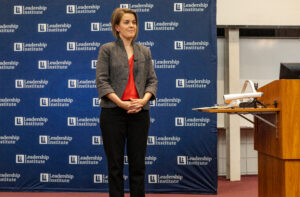OPINION: When professors release the syllabus at the start of the semester, one of the things I look for is if they’re planning to have class on the Tuesday before Thanksgiving break.
There are three possibilities. The first are the practical professors who prefer to cancel class to save themselves and their students the trouble. The second are those who have scheduled a test that day, as a preemptive way to assure students that every single class is going to be critical for their success. These professors are scary. The third scenario consists of professors who have scheduled class but have not specified any significant topics to be covered.
These professors are often bluffing, or if they’re not bluffing, then they might be kidding themselves. This is when a useless standoff between students and professors begins.
As students prepare for their holiday break, they make a bet, trying to guess what actions their professors and classmates will take, which is exhausting.
Most students think that the safest choice is to believe the professor and plan to attend class on Tuesday. However, if they cancel class at the last minute and your travel plans are for Wednesday, then you’re stuck. On the other hand, you could bet on the class being canceled and continue with your travel plans. If attendance is expected to be very low, the professor will cancel the class. However, if the class is held, you will miss out on important content.
The best outcome is to bet on the professor canceling class without being one of the ones to inform them, giving you an extra day at home and maintaining your reputation for good attendance. However, this strategy is quite risky.
What’s the professor’s logic? Insurance against snow and sick days? A secret test of students’ fortitude? A commitment to their students’ education? Unfortunately, only the professors themselves can answer this question.
Instead of putting students and professors in a situation that necessitates game theory to understand, it would be much easier for the University of Maine to simply give us the Tuesday before Thanksgiving off.
This would prevent many students from seeking advice from family members, guessing and sending apologetic emails about their plans to skip class. It would also spare professors from the dilemma of whether or not to schedule a class on a Tuesday.
If UMaine were to give us Tuesday off, then Monday’s attendance would be even more at risk of cancellation. That day is already guaranteed low attendance with the current syllabus setup. To prevent this issue altogether, UMaine should cancel both days.
Let’s face it, how many of us will be able to accomplish productive work with thoughts of turkey and mashed potatoes on our minds? It’s not that we lack the effort to try, but after twelve weeks of rigorous coursework, our attention is practically non-existent.
If UMaine decides to cancel Monday classes, it makes sense to also cancel the preceding Friday’s classes for students who want to beat the holiday rush. It’s hard to focus on a regular Friday, let alone the Friday before Thanksgiving week. If UMaine cancels Friday classes, then Thursday’s classes could also be unnecessary as flights would likely be cheaper. As for Wednesday, that might be pushing it too far, but it sure is wishful thinking.
In the current situation, professors and students are making holiday plans while challenging others to make the first move in this odd system, one that other Maine colleges don’t bother with. Colby College, Bowdoin College, Bates College and Maine Maritime Academy all give their students the whole week off. UMaine should follow suit for the sake of everyone’s holiday and travel plans.











